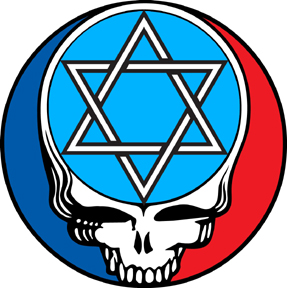Soapbox: Jews for Jerry

Many a Deadhead during the years has likely remarked offhandedly that a particularly deep “Dark Star” jam or a searing peak in “Morning Dew” amounted to a religious experience.
For Jews who’ve found a spiritual home within the sphere of the Grateful Dead, that just might be true.
The perceived overlap between the worlds of the Dead and Judaism has proven to be a fertile subtopic among fans, writers and academics who are used to scouring the Grateful Dead experience for bits of debatable theory. But what’s the essence of the connection?
Only one Grateful Dead band member – Mickey Hart – is Jewish. Though the Dead dipped deeply into the reservoir of American music, it was not known to recast Hebrew prayers or treat in explicitly Jewish imagery. It played concerts in honor of the Chinese New Year, not Rosh Hashanah.
Yet, for secular Jews open to spiritual pursuit but uninterested in strict religious observance, the Dead may have provided a conduit for the sort of spiritual expression that they felt was lacking elsewhere.
“The Grateful Dead is a good example of people searching for the other, whatever that means, in terms of spirituality – trying to find something that goes beyond their own identity, beyond themselves,” argues Rob Weiner, editor of Perspectives on the Grateful Dead, a compendium of scholarly writings on the band. “It’s an important way to help them live their lives in a moral and reasonable way.”
But what about this is specifically Jewish?
There is indeed the sense of a marginalized tribe assimilating into broader culture, while self-identifying with subtle cues – be it a Garcia tie or dancing-bear bumper sticker – and finally letting the freak flag (or yarmulke) fly once its members are assembled together in ceremony. “Deadheads lived fairly normal lives until they went to a Grateful Dead show,” recalls Barry Smolin, host of “The Music Never Stops” on KPFK-FM in Los Angeles. “And then they would don the apparel and be Deadheads very openly and freely and without paranoia.”
The Dead scene has largely been absorbed into broader pop culture – safely sterilized in the straight world as a tie-dyed postcard from a quaint but strange country. But for much of the band’s life, they dwelled far from the mainstream.
“Deadheads felt like outcasts in America, yet we were outcasts who built a very strong and vital and joyful community,” observes Steve Silberman, a writer who earned gold records for co-producing the So Many Roads (1965-1995) box set and penning liner notes for re-releases of Workingman’s Dead and Europe ‘72. “There’s a wink-wink understanding that we’re always in the same tribe. It’s a feeling of being both outcast and deeply inside. You’re deeply inside something that the uninitiated do not understand. It gave you a place to be special in a world in which you were told that you were less than ordinary.”
The propensity of serious Deadheads to knowledgably debate every chapter and verse of the band’s live oeuvre – easily summoning dates, statistics and other minutiae with lawyerly acumen – has been likened to the Jewish tradition of Talmudic disputation in which long passages of theological analysis detail the unresolved arguments among rabbis over the fine points of Hebraic law.
Leora Lawton, a sociology professor at University of California in Berkeley, cites Kabbalistic belief in the divinity of music. She says that music has always had particular importance to Jewish spiritual practice – particularly drums and percussion. In Exodus, after Moses leads his people to safety across the Red Sea and offers a prayer of thanksgiving, the women break out tambourines and start dancing. “The percussion creates a rhythm that allows one to get into a meditative state, which allows prophecy to happen in Jewish thought,” says Lawton.
There’s also the matter of a Grateful Dead show as a sacred space – independent from the profane world – where spiritual expression is possible through music, dance, and fellowship with a like-minded community.
Concertgoers didn’t follow a theological dogma – though show etiquette and certain lyric-derived catchphrases, like “I need a miracle every day,” may have come close among some elements of the scene – but for the true believers, the sense of ceremony and profound expectation seemed to be of an entirely different variety than concerts by The Rolling Stones or Bob Dylan.
“Shows were very much like a secular Sabbath,” says Silberman. “[The Grateful Dead] were open to discovering [the sacred] every night, in the next set or the next song or the next transition. The possibility of the sacred being revealed was always there, but it was also never certain. You could have two shows that were relatively lame. But, just to be in the room when the sacred might be revealed, in these exploratory observations…”
He trails off for a moment, as if trying to describe the ineffable. Perhaps he is.



















